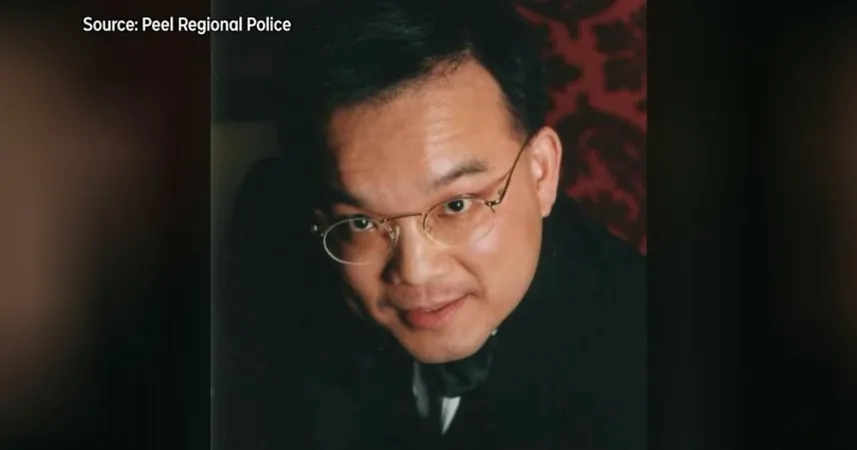
Canadian Supreme Court Faces Pivotal Decision on Assisted Suicide and Murder Charges Against Alleged Kit Seller
2024-10-07
Author: Benjamin
Overview
In a groundbreaking legal battle, the Ontario man accused of selling hundreds of suicide kits worldwide is taking his case to Canada’s Supreme Court, challenging the notion that assisted suicide can ever be classified as murder under Canadian law.
The Case of Kenneth Law
Kenneth Law, 34, has been linked to the tragic deaths of at least 14 individuals in Ontario who reportedly consumed products sold by him, which includes toxic substances and equipment intended for suicide.
His legal team argues that the nature of his actions cannot warrant murder charges, stating, “Assisting suicide is not murder.” They emphasize that Law was not present during these deaths and did not deceive victims into taking his products.
Background and Arrest
Law's arrest in May 2023 marked the start of a case that has captured national attention. Initially charged with aiding and abetting suicide, he was later indicted on first-degree murder charges in January 2024, implicating him in the intentional deaths of those who used his products.
Investigations have traced over 1,000 packages worldwide, leading reports to estimate that the fatalities linked to his products exceed 130.
Victim Impact: The Case of Liana Kirk
Among the victims was 21-year-old Liana Kirk from New Zealand, whose father, Dale Kirk, described her descent into severe mental health struggles exacerbated by the pandemic.
He recounted Liana's vibrant childhood, marked by joy and laughter, which ultimately gave way to darkness. A coroner's report revealed that she ordered a suicide kit from Law in September 2022 and died a month later.
Dale, a former New Zealand police officer, expressed his relief that Canadian authorities are taking the matter seriously, though he mourns the absence of action regarding his daughter’s case in New Zealand.
Legal Implications and Appeal
The case is poised to reshape Canadian law regarding assisted suicide, as the Crown appeals a ruling from the Ontario Court of Appeal. This ruling suggested that for actions to be classified as murder, a victim's free will must be overcome, a standard that complicates the prosecution of cases involving suicide assistance.
As argued by Crown lawyers, this legal precedent could deeply influence how current and future cases are handled, including Law’s own situation, which is a part of the broader appeals process.
Expert Insights
Legal experts suggest that the Supreme Court's upcoming decision holds significant implications. Toronto-based criminal defense attorney Ingrid Grant noted that the current legal landscape presents a narrow pathway to convict someone for murder in assisted suicide cases.
However, she hints at a possibility that circumstances could lead to a conviction if there's evidence of a more active role in the suicide planning or encouragement.
Conclusion and Future Outlook
With the stakes incredibly high, Law faces 14 counts of murder and an additional 14 counts of aiding and abetting suicide, which could result in life imprisonment if he is convicted of murder, whereas aiding and abetting typically carries a lesser penalty.
As this unfolding drama prepares for its next chapter in September 2025, the eyes of the nation—and potentially the world—will be on the Supreme Court's ruling and what it may mean for the ongoing discourse surrounding assisted suicide in Canada.
This case not only challenges legal interpretations but also puts a spotlight on mental health issues, societal responsibilities, and the conflict between personal autonomy and the role of law in matters as sensitive as assisted dying.
Will the court’s ruling set a precedent that could either criminalize or normalize assisted suicide, or will it simply add to the complexities of an already intricate legal issue? Stay tuned as this pivotal courtroom saga continues to evolve.









 Brasil (PT)
Brasil (PT)
 Canada (EN)
Canada (EN)
 Chile (ES)
Chile (ES)
 España (ES)
España (ES)
 France (FR)
France (FR)
 Hong Kong (EN)
Hong Kong (EN)
 Italia (IT)
Italia (IT)
 日本 (JA)
日本 (JA)
 Magyarország (HU)
Magyarország (HU)
 Norge (NO)
Norge (NO)
 Polska (PL)
Polska (PL)
 Schweiz (DE)
Schweiz (DE)
 Singapore (EN)
Singapore (EN)
 Sverige (SV)
Sverige (SV)
 Suomi (FI)
Suomi (FI)
 Türkiye (TR)
Türkiye (TR)